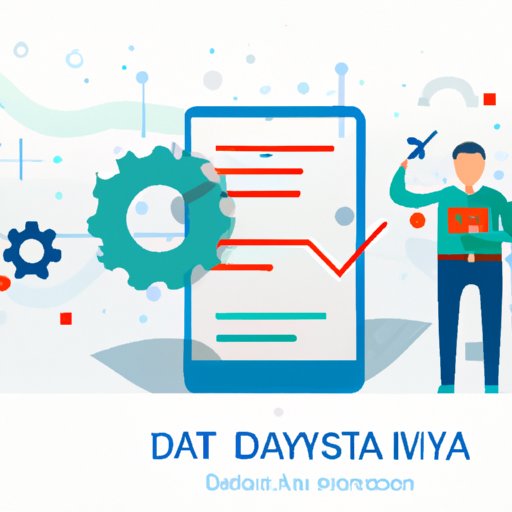How to Become a Data Analyst: Your Step-by-Step Guide to a Career in Data Analysis
In today’s fast-paced world, data analysis has become an integral part of businesses and organizations across various industries. As a result, the demand for skilled data analysts has skyrocketed, making it a promising career path for many. This article will provide you with a step-by-step guide on how to become a data analyst. We’ll cover education, skills, tools, and career advancement strategies to help you start your journey in the world of data analysis.
Step-by-Step Guide to Becoming a Data Analyst
First and foremost, let’s understand what a data analyst is. A data analyst is someone who collects, processes, and performs statistical analyses on large datasets to extract insights and information. They work with data to discover patterns, trends, and relationships that can help organizations make informed decisions.
The importance of education cannot be understated in data analysis. Although a degree in computer science, mathematics, or statistics is ideal, there are numerous options for becoming a data analyst. Certifications and boot camps in data analysis can provide the necessary knowledge and skills.
To be an effective data analyst, one should have a good command of programming languages like Python and R, as well as statistical knowledge. Other necessary technical skills include SQL, Excel, and data visualization tools like Tableau.
There are several career paths within data analysis, including data scientist, business analyst, database administrator, and research analyst. The day-to-day responsibilities of a data analyst can vary based on the industry and organization, but they typically include tasks like collecting and cleaning data, analyzing data sets, and providing reports.
Tools Every Data Analyst Should Know How to Use
Data analysis requires using a variety of tools effectively. It’s essential to be proficient in Excel, SQL, Tableau, and at least one advanced programming language like Python or R. Using these tools smartly is crucial in achieving the desired results. Understanding which tool to use for a particular task and how to utilize it effectively can make job performance efficient.
When using Excel, it’s important to develop advanced functions like conditional formatting, pivot tables, macros, and more. Additionally, SQL is crucial, especially for database administration, data cleaning, and database querying. Tableau can be leveraged to create impactful visualizations that can support data storytelling better. Lastly, proficiency in at least one advanced programming language like Python or R will enable data analysts to perform advanced statistical operations.
Mastering the Art of Data Analysis
In addition to technical experience, data analysts need a range of soft skills. Good communication, problem-solving skills, critical thinking, and time management are essential for the day-to-day operations of the job. Additionally, data analysts need to understand how to present information to both technical and non-technical stakeholders.
There are numerous ways to develop and improve soft skills. Reading data analysis blogs, attending webinars, and listening to podcasts on the latest data analytics trends and techniques are all ways to improve. Also, engaging in team-building activities in which problem-solving skills are put to test can help improve a data analyst’s soft skills.
Interviewing for a Data Analyst Role? Here’s What to Expect
When interviewing a candidate, employers look for specific skills like attention to detail, problem-solving abilities, critical thinking, communication skills, and experience in using data analytics tools. Regarding interview questions, expect both statistical and behavioral questions at the interview.
Statistical questions may include:
- What is a confidence interval?
- How do you deal with missing data points in a data set?
- What is correlation?
Behavioral questions may include:
- How do you handle difficult data analysis problems?
- How do you manage competing priorities and deadlines while working under pressure?
- What was your most challenging project to date, and how did you approach it?
Preparing for data analysis case study assignments in an interview can be helpful. Practicing statistical operations, and creating visualizations with industry data can help to succeed in interviews.
Career Advancement for Data Analysts
With appropriate experience and education, data analysts can advance to senior roles like data scientists, analytics managers, or data engineers. They can become team leads or mentors to junior analysts, which can provide opportunities to grow both professionally and personally.
As career advancement strategies, data analysts can pursue advanced degrees in fields like data science or computer science. Networking within the industry by attending meetup groups, conferences, and building upon relationships can lead to new opportunities for growth. Look for mentorship opportunities to gain additional experience.
Conclusion
Becoming a data analyst is attainable with perseverance and determination. Pursuing a degree in computer science, statistics, or related fields provide a robust foundation in data analysis. There are numerous online resources and introductory courses, boot camps to gain experience in the field. Proficiency in SQL, Excel, Tableau, Python, or R is a necessity. Soft skills such as communication, problem-solving, and critical thinking are also critical components of career advancement. It’s up to the individual to keep up with the latest trends in data analytics and take advantage of growth opportunities. With that in mind, go ahead and start your journey into data analytics with confidence.
